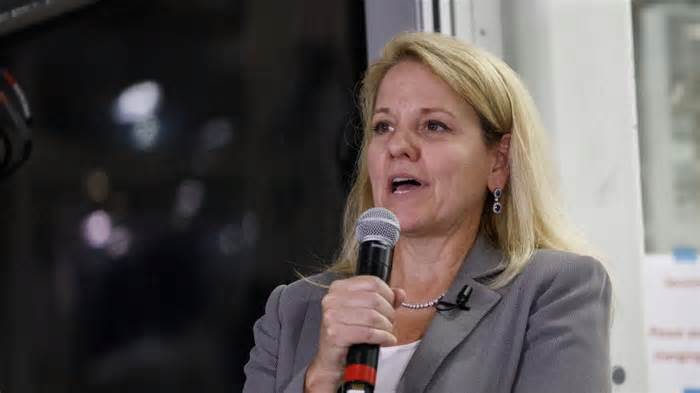
Preserving Humanity’s Legacy in Space: A Journey with Lanette Phillips
- by Impacts
- Nov 07, 2024
- 0 Comments
- 0 Likes Flag 0 Of 5

Email
Lanette Phillips is a trailblazer, not just in the entertainment world where she produced hundreds of music videos for stars like Eminem, Beyoncé, and Rihanna, but also in the space exploration arena. Her current focus is much larger than the Earth itself—she is now part of efforts to preserve humanity’s knowledge and culture in space. In a recent conversation at Future Blockchain Summit in Dubai with London Real host Brian Rose, Lanette shared her extraordinary journey from the music industry to her role in the Arch Mission Foundation, a project focused on archiving humanity’s legacy on the Moon, Earth and, soon, Mars.
From Music Videos to the Moon
Lanette’s early career was deeply rooted in the entertainment industry. Moving from San Diego to Los Angeles in her 20’s, she dove into the world of music video production, working on iconic projects for some of the biggest names in music. Reflecting on her career, she said, “I’ve probably produced over 1,000 music videos,” working with a roster of superstars that included Michael Jackson, Beyoncé, Eminem, and Elton John.
When asked what makes a great music video, Lanette emphasized the importance of a strong vision: “A great concept, a willing artist, a forward-thinking record company that participates in creative freedom, and a director with a vision that sticks with it.” Her deep involvement in crafting these memorable visuals laid the foundation for her next great adventure—bringing art, knowledge, and culture into space.
The Arch Mission Foundation and Preserving Humanity
Lanette’s journey into space exploration began when Nova Spivak, founder of the Arch Mission Foundation, invited her to collaborate on an ambitious project—a music concert on the Moon. While the original idea of a live moon performance didn’t materialize, the team quickly pivoted to something equally significant: preserving humanity’s knowledge in lunar libraries.
Lanette explained the mission, saying, “We thought that would be a great way to preserve humanity’s knowledge, art and music culture.” This initiative involves sending digital libraries to the Moon, encoding vast amounts of information onto nickel nanofiche an ultra durable analog storage medium that will survive for billions of years. The “lunar libraries” contain everything from the entire English Wikipedia, 5000 languages, Project Gutenberg, Panlex dataset, corporate logos, cultural artifacts and more.
“The concept is to preserve everything about humanity—our languages, art, music, history—so that if something happens to Earth, future generations or other civilizations can access this knowledge,” she shared. This futuristic initiative echoes a long-standing human desire to leave a mark on the universe, much like ancient civilizations preserved their histories in tombs and caves.
Collaborating with SpaceX
Lanette’s work also extends beyond lunar missions. Arch Mission collaborated with Elon Musk’s Solar Mission when SpaceX famously launched the Tesla Roadster into space on the Falcon Heavy rocket. In the glove compartment of that car were two of Arch Mission’s discs, containing one of Musk’s favorite trilogies: Isaac Asimov’s “Foundation.” These discs, now orbiting the sun, are estimated to remain there for over 240 million years.
“There’s a lot of little Easter eggs in it,” Lanette quipped, referring to the hidden gems and symbolic content packed into the mission. Musk’s gesture was not just a stunt, but a testament to his belief in species redundancy—ensuring that humanity’s knowledge and culture are preserved in case Earth faces catastrophic events.
Landing on the Moon and Future Mars Missions
In February 2024, the Arch Mission Foundation successfully landed one of its lunar libraries on the Moon’s south pole—a historic achievement since this region has been unvisited since the Apollo 17 mission in 1972. Lanette emphasized the significance of this accomplishment: “There’s constant sunlight, fossil records of hydrogen and water ice. It’s a perfect spot to place solar panels, take pictures, and build other crafts for planetary exploration.”
However, not all missions have gone smoothly. Earlier in January, an Astrobotic Lunar Lander carrying one of Arch’s libraries exploded during its journey to the Moon. “The odds are kind of 50/50,” Lanette admitted, referencing the inherent risks of space exploration.
Despite the challenges, the Foundation has ambitious plans for the future, including a mission to Mars. This mission will require even more meticulous preparation due to the harsh Martian environment. Lanette described how people are already simulating life on Mars by living in habitats on Earth. “They’re building gardens in their habitats and just going about maintaining life, whether they’re singles, families, or couples. It’s an experiment to see how people could survive,” she explained.
Humanity’s Need to Leave a Legacy
A central theme in Lanette’s work is humanity’s deep desire to leave something behind—a mark on the universe. Whether it’s through ancient hieroglyphs or graffiti, there’s an innate need for humans to document their existence. Brian Rose asked Lanette about this phenomenon, to which she responded, “I believe we’re the most technically advanced in human history, but if something were to happen—say, a nuclear bomb or the grid went down—we will not have the backup.”
Lanette’s work is all about ensuring that humanity’s legacy isn’t lost, regardless of what happens on Earth. “We’re constantly collecting data and so far have 41 million pages of data on the Moon for preservation,” she noted. The project doesn’t just focus on space; Arch Mission is also creating repositories of knowledge on Earth, hidden in volcanoes and other secure locations.
The Role of AI in Humanity’s Future
As the conversation touched on artificial intelligence (AI), Lanette shared her views on how humanity and AI might coexist. She noted that while AI is transforming industries, there are still areas where human beings are irreplaceable. “AI cannot create. It’s not creative, empathtic or humorous” she observed, highlighting the importance of human roles in fields in comedic script writing, social work, and mental health.
Lanette remains optimistic about the future of AI and humanity, believing that the two can work together. However, she also noted that preserving human knowledge in its rawest form—etched onto physical discs and stored in space—might be humanity’s best bet for long-term survival.
Conclusion: A Mission for Humanity
Lanette Phillips’ journey from producing music videos for global icons to preserving humanity’s legacy on the Moon and beyond is nothing short of remarkable. Through her work with the Arch Mission Foundation, she is ensuring that even if the worst happens to Earth, future generations—or even extraterrestrial civilizations—will have access to our art, culture, and scientific knowledge.
Her message is clear: We must take steps now to ensure that our legacy outlasts us. As Lanette says, “If everything goes down, we really don’t have the backup.” Her work is a safeguard against that scenario, a beacon of hope in an uncertain future, ensuring that no matter what happens, humanity’s story will live on—on Earth, the Moon, and beyond.
About Arch Mission:
The Arch Mission Foundation is a pioneering organization dedicated to preserving and disseminating humanity’s knowledge, art, and culture across space and time. With projects that aim to create resilient “libraries” on the Moon, Mars, and even in orbit around the Sun, the Foundation’s work seeks to ensure that human civilization’s legacy endures, no matter what challenges the Earth might face. By using ultra-durable storage technologies like nickel nanofiche, which can survive for billions of years, the Arch Mission stores vast collections of data, including the entirety of English Wikipedia, literary works from Project Gutenberg, and linguistic datasets like PanLex. Through collaborations with organizations like SpaceX, the Arch Mission has already succeeded in placing knowledge archives aboard missions, including a lunar library on the Moon’s south pole and digital copies of Asimov’s
Foundation
series orbiting the Sun. The Foundation’s projects reflect humanity’s ancient desire to leave a lasting imprint on the universe, ensuring that future generations or other civilizations might one day access the story of Earth’s inhabitants.
www.archmission.org/
Please first to comment
Related Post
Stay Connected
Tweets by elonmuskTo get the latest tweets please make sure you are logged in on X on this browser.
Sponsored
Popular Post
Tesla: Buy This Dip, Energy Growth And Margin Recovery Are Vastly Underappreciated
28 ViewsJul 29 ,2024






 Energy
Energy



















